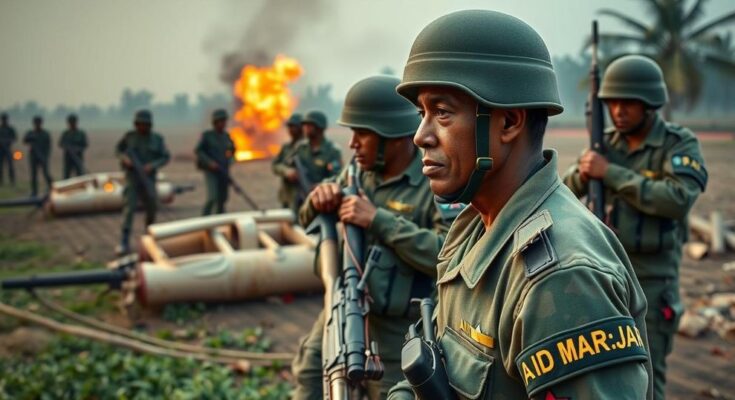The Arakan Army has gained control over significant parts of Rakhine province, leading to concerns about regional stability and a possible influx of Rohingya refugees. The ongoing civil war in Myanmar, exacerbated by a military coup in 2021, has led to an increased focus on India’s strategic interests amidst rising challenges, including border security and refugee management. The necessity for dialogue among all factions to create an inclusive democratic framework is critical for sustainable peace.
The ongoing civil war in Myanmar has intensified, with the Arakan Army (AA) gaining control of significant territories in the Rakhine province. This power shift has critical implications for border dynamics between Myanmar and Bangladesh, particularly raising concerns over a potential influx of Rohingya refugees fleeing conflict. Since a military coup in 2021, Myanmar has been engulfed in turmoil, which has largely gone unnoticed by the international community, redirecting focus toward conflicts in Europe and the Middle East.
The Arakan Army, representing the interests of the ethnic Rakhine population, has been engaged in fighting the military junta for autonomy and control over local resources, forming part of the Three Brotherhood Alliance. This coalition has recently launched successful operations, marking a historical shift in military control within the region. With reports suggesting the AA’s presence extending into Bangladesh, the likelihood of conflict with the Bangladeshi military could exacerbate regional instability.
Despite their claims to the Rakhine region, the Arakan Army has a controversial history regarding the Rohingya community, which Myanmar does not recognize as citizens. After a violent military crackdown in 2017, hundreds of thousands of Rohingya sought refuge in Bangladesh, with India facing related refugee challenges as well. Sripathi Narayanan, a foreign and security analyst, emphasizes the problematic use of Rohingya populations by both the junta and rebel forces: “The Rohingya have been used as cannon fodder by both the junta and the rebels.”
India’s response to these developments has involved heightened scrutiny of the situation. The country has enacted stricter border controls due to fears of advanced weaponry from Myanmar’s rebel factions jeopardizing security in its northeastern states. The presence of drug trafficking linked to these groups further complicates India’s concerns.
India’s strategic interests are intertwined with the ongoing conflict, as its initiatives—such as the Kaladan project—are at risk. This project aims to facilitate connectivity between the Indian northeast and the Bay of Bengal but faces delays amid the chaotic security landscape. India is attempting a dual engagement strategy, interacting with both the Arakan Army and Myanmar’s government. Cchavi Vasisht, a research associate with the Chintan Research Foundation, states, “We need to make further efforts to increase our engagements with AA…” to safeguard its interests and promote dialogue toward a sustainable peace process.
To navigate the complexities of the Myanmar situation, India is advocating for inclusion in political dialogue among all factions to establish a democratic framework that represents various ethnic communities. Ms. Vasisht suggests that India’s focus should be not only on its border security but also on a broader vision for peace in Myanmar that includes democratic transition.
The Arakan Army’s rise is emblematic of the broader ethnic conflicts in Myanmar, particularly following the coup in February 2021 which displaced the elected government. The ensuing strife has enabled ethnic armed groups to assert their control over significant territories, altering the security dynamics in the region. The Arakan Army’s objectives, aimed at achieving autonomy within Rakhine state, dovetail with the historical context of grievances surrounding ethnic and resource control, especially concerning the Rohingya population. As Myanmar’s civil war continues, regional concerns about refugee movements, security implications, and geopolitical influences, particularly from China, have intensified attention on the conflict’s wider ramifications.
The escalation of conflict in Myanmar, particularly the Arakan Army’s control over Rakhine, poses significant challenges for regional stability, security, and humanitarian conditions. The intertwining crises resulting from ethnic violence, refugee flows, and India’s complex geopolitical concerns underscore the urgent need for a comprehensive dialogue to foster peace and stability. As India navigates its dual engagement strategy with both the Arakan Army and the military junta, prioritizing an inclusive political process remains crucial for fostering long-term peace in the region.
Original Source: www.ndtv.com




